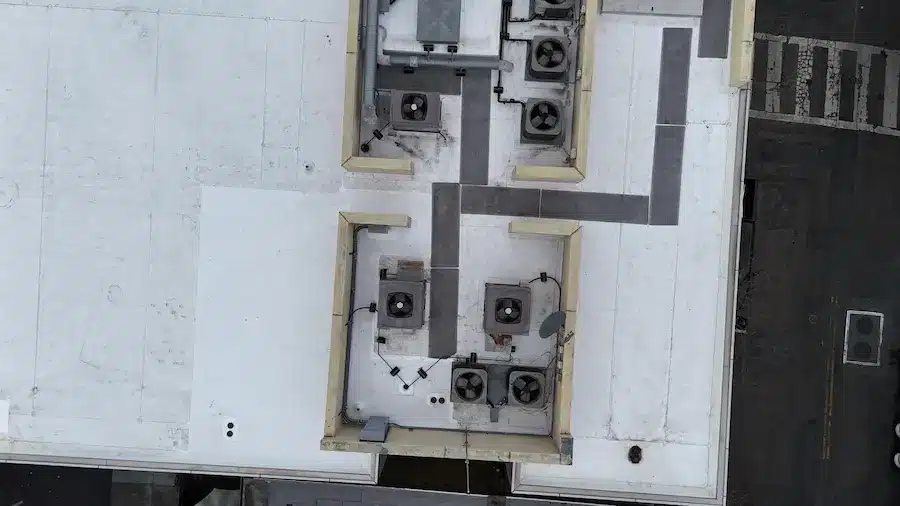⭐⭐⭐⭐⭐ 5-Star Rated
CA State Licensed Contractor #1090028
1000+ Roofs Installed
Lifetime Roofing & Renovation
Top-Rated Commercial Roofing Contractors Specializing in Bay Area Business
Residential & Commercial Roofing Across the East Bay
Lifetime Roofing & Renovation
Top-Rated Commercial Roofing Contractors Specializing in Bay Area Business
Residential & Commercial Roofing Across the East Bay
When it comes to roofing inspection costs, knowledge is power. Understanding what to expect and how to budget for this essential maintenance task can save homeowners both time and money in the long run.
On average, business can expect to pay between $200 and $700 for a roofing inspection. However, prices can vary widely based on the factors previously discussed, including roof size, type, and complexity. For instance, a small, straightforward inspection may only cost around $100, while larger or more complicated roofs could exceed $1,000.
“According to GAF, building roofs should be inspected at least once per year, ideally before storm season…”
WHY CHOOSE US
Atherton homeowners trust Lifetime Roofing & Renovation for expert craftsmanship, premium materials, and reliable service. We deliver roofing solutions that protect your home and enhance its value built to last for decades.
Our process
"Our certified roofers ensure every commercial roofing inspection is conducted with precision, safeguarding your structure against damage and optimizing long-term performance.”
Set up your inspection at your convenience. We’ll work around your schedule and business hours to minimize disruption—making the process seamless and stress-free.
Our trained professionals conduct a hands-on evaluation of your roof, including the interior, perimeter, membrane, flashing, drainage, and rooftop equipment—ensuring we uncover every potential issue.
You’ll receive a detailed digital report featuring annotated photos, severity ratings, cost estimates, and summaries—arming you with clarity and evidence for informed decision-making.
Based on our findings, we’ll provide tailored repair or replacement options, recommend maintenance intervals, and help prioritize actions that maximize your building’s safety and extend your roof’s lifespan.
Local Service Areas
14+ years of expertise
Customer satisfaction is our mission. Clients trust us for minor repairs and complete roof replacements, knowing we deliver top-quality workmanship and reliable, timely service.
TESTIMONIALS
Customer satisfaction is our mission. Clients trust us for minor repairs and complete roof replacements, knowing we deliver top-quality workmanship and reliable, timely service.
Our commitment to reliability, professionalism, and top-tier results has made us one of California's most trusted roofing companies.
14+ years of expertise
Get A Free Quote


Transforming Roofs, Elevating Homes
Is your roof ready for an upgrade? Enhance your home’s protection and beauty with a new roof! Our expert team specializes in roof replacements and repairs, ensuring quality craftsmanship and a customer-focused approach. We keep you informed, and maintain a clean work environment while completing projects efficiently.
FAQ
We address your roofing concerns with personalized solutions, providing reliable service and expert guidance to protect your home or business.
Experts recommend scheduling a roof inspection at least twice a year, ideally in spring and fall. It’s also wise to arrange one after severe weather events to catch any hidden damage early. Frequent inspections help extend your roof’s lifespan and minimize costly repairs. find what suits you best.
Exterior: membrane condition, flashing, drainage, signs of wear or ponding
Interior: looking for stains, moisture, insulation damage
Other features: rooftop equipment, vents, and structural concerns
This comprehensive approach ensures no issue goes unnoticed.
Inspection time varies depending on roof size and complexity. A basic commercial inspection can take anywhere from 30 minutes to several hours. Your roofing professional will provide a specific estimate when scheduling. Schedule your inspection today to get started with expert insights.
Cracked or blistered membrane
Ponding water or clogged drains
Loose or deteriorated flashing
Visible stains or mold inside
Early action on these red flags prevents small issues from becoming business interruptions.
Explore our service areas to check if we’re available near your home or business.
No—it’s not required. While some walkthroughs are helpful, our inspectors can conduct a thorough assessment independently and deliver a detailed report afterward for your review.
Yes! You’ll receive a digital inspection report, complete with annotated photos, identified issues, and prioritized recommendations for repair or maintenance.
Professional inspectors bring expertise, tools, and safety protocols. They detect issues invisible to untrained eyes—like minor flashing gaps or trapped moisture—that can cause serious damage if unaddressed.
Inspection costs vary based on roof size, material, access difficulty, and level of detail (e.g., infrared or drone included). However, the cost is minor compared to the savings from early problem detection and the extension of roof life.
Following the report, we’ll discuss whether targeted repairs are best or a roof replacement makes more sense for long-term value. We’ll help you decide based on cost-benefit analysis, roof condition, and future needs.